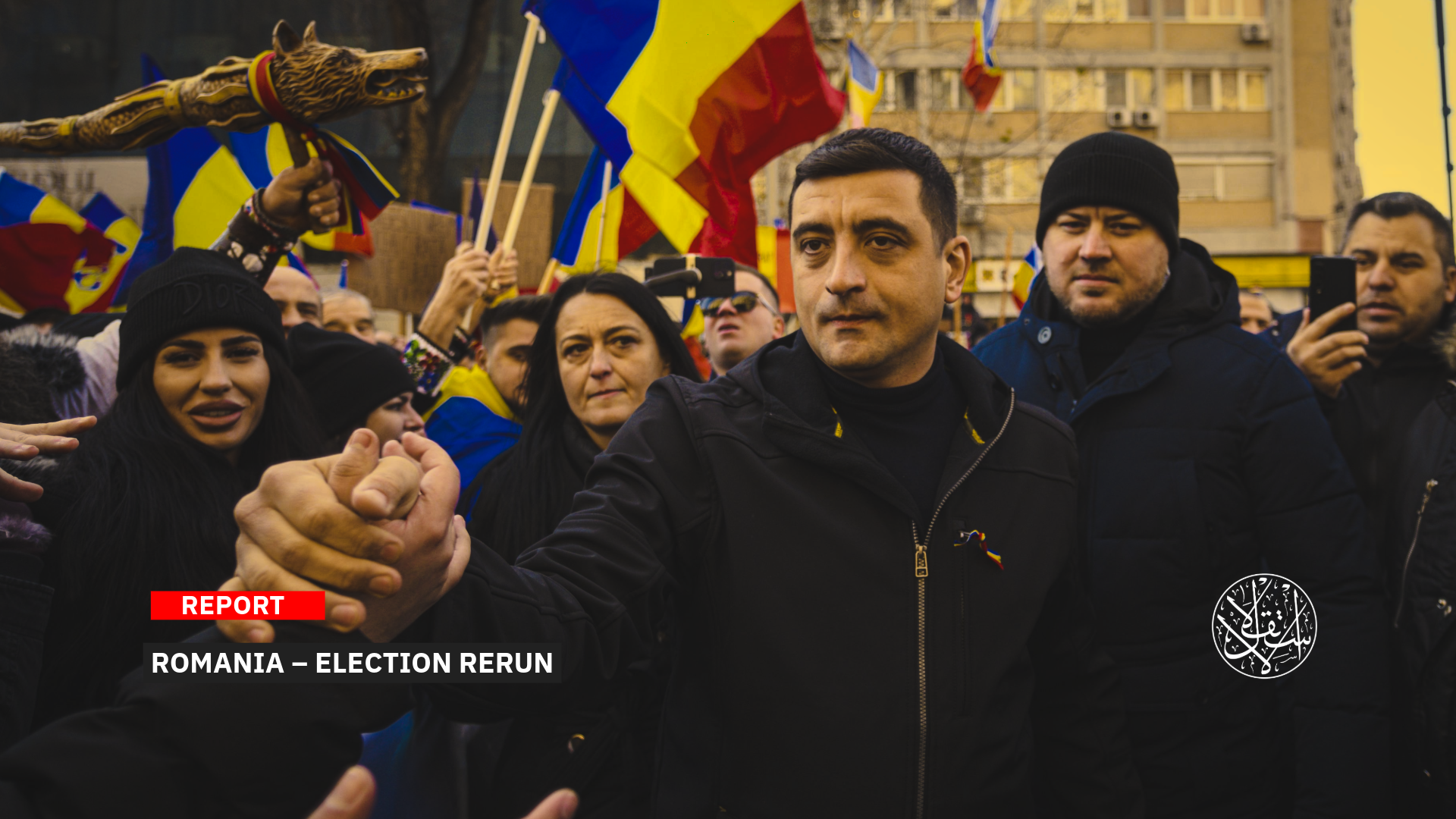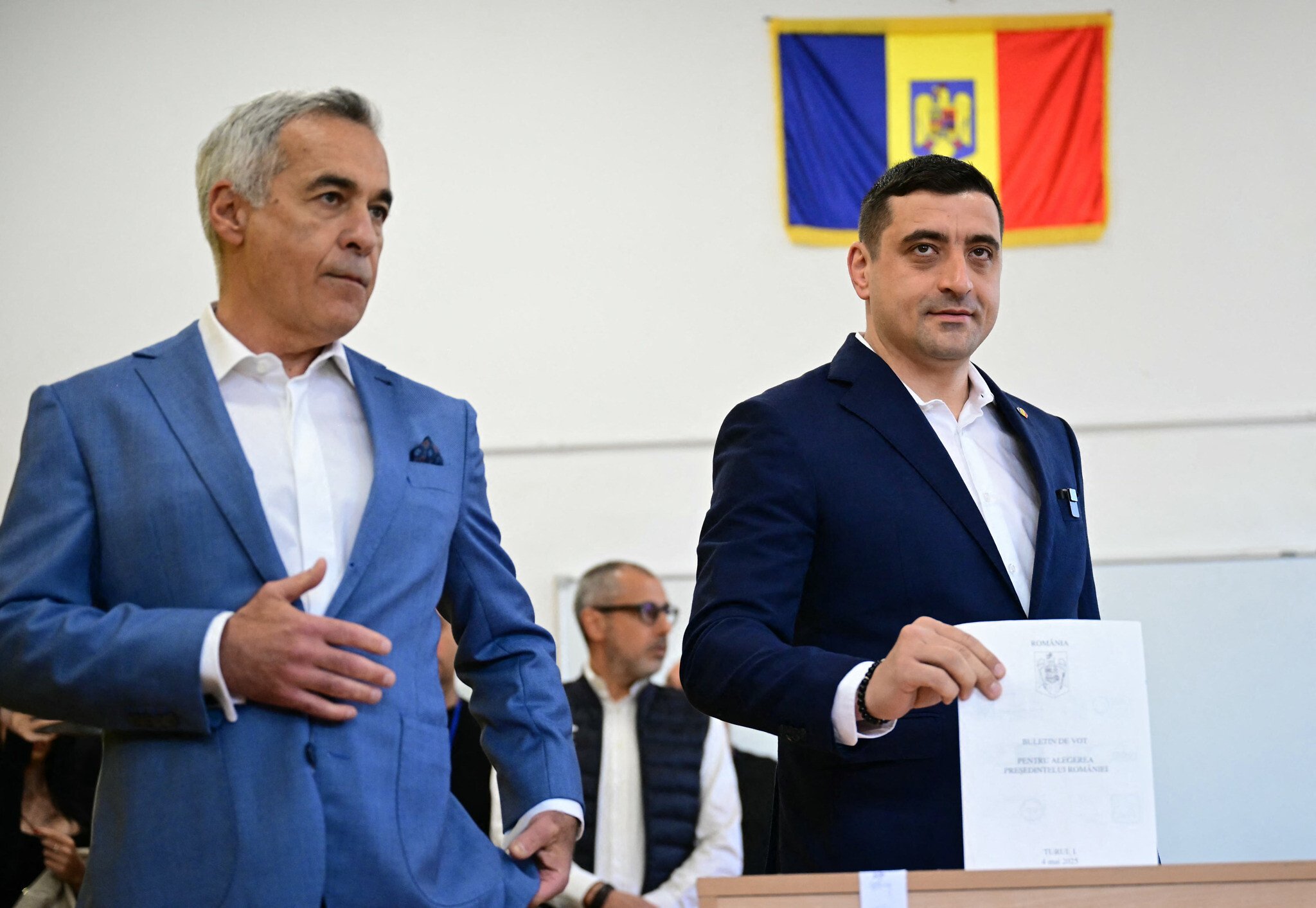Romanian Election: How George Simion’s Potential Victory Is Being Nervously Awaited in Europe

“Far-right leader George Simion will face pro-EU centrist Nicusor Dan in the run-off on May 18.”
In a remarkable political development that portends radical shifts in the European geopolitical landscape, far-right candidate George Simion won the first round of Romania's presidential election by a wide margin over his closest rivals.
The Romanian vote for Simion came against the backdrop of the annulment of last November's presidential election, citing Russian influence, and the disqualification of another right-wing candidate, Calin Georgescu, from the presidential race due to accusations of receiving suspicious funding and contacts with the Kremlin.
So Simion tried to capitalize on Georgescu's popular base, announcing his intention to offer him a senior position, possibly prime minister – if Simion is elected president.
Simion's recent surprise victory reflects serious concerns about a redrawing of the military and political balance on NATO's eastern front, especially in light of the ongoing fierce war in Ukraine against the Russian invasion.
His success in reaching the second round of the elections places Romania at a crossroads in its relationship with the European Union and highlights the popularity of EU critics.
Since the collapse of communism in 1989, Romania has not seen a similar surge of far-right support, but its 19 million people appear to be fed up with economic hardship and the ongoing war in neighboring Ukraine.
Political Power
Romanian Prime Minister Marcel Ciolacu resigned a day after a far-right opposition leader won the first round of the presidential runoff, and his government's candidate was eliminated from the race.
Ciolaccu said his center-left Social Democrat Party (PSD) would withdraw from the pro-Western coalition, effectively ending it, while government ministers would remain in their posts temporarily until a new majority emerges after the second round of the presidential election.
Eurosceptic George Simion, 38, won the first round of the presidential election on May 4 with nearly 41% of the vote.
He will face pro-EU Bucharest Mayor Nicosur Dan, 55, a centrist independent running on an anti-corruption platform, in a runoff on May 18.
Simion’s Alliance for the Union of Romanians (AUR) and two other nationalist parties won more than a third of parliamentary seats, and forming a new majority without the far-right bloc will be hard, even more so if Simion is elected president.
Dan, for his part, described the runoff as a way to convince Romanians that Romania needs its pro-Western direction.
In his first comments after the results were announced, he said, “Our task now is to convince Romanians that the country needs a pro-Western orientation, and we will focus our campaign on this goal over the next two weeks.”
In the second round, Dan is expected to try to form an alliance of all mainstream forces to defeat Simion, but may struggle to do so.
This is especially true since Simion may gain votes from supporters of former PM Victor Ponta, the left-wing politician turned supporter of US President Donald Trump, who won 13.3% of the first-round vote.
Simion said after the result that his win was not just an electoral victory, “it is a victory of Romanian dignity, and it is the victory of those who still believe in Romania, a free, respected, and sovereign country.”
He noted that his goal is to repair relations with the EU and the U.S., emphasizing that the desire to reform the EU does not mean a desire to leave it.
Simion carried a sacred religious image upon entering the polling station, exploiting national and religious symbols to build a broad popular base, particularly among young people and rural residents.

Far-Right Leader
The first-round election result is the culmination of George Simion's rise from marginal agitator to far-right leader, and if he reaches the Cotroceni presidential palace in Bucharest, he could become the most powerful man in Romania.
Simion's party has made significant electoral gains in recent years, exploiting popular discontent with the traditional political elite, rising living costs, and widespread poverty.
His party relies on anti-immigration and anti-Western rhetoric, and also promotes conspiracy theories about the role of the European Union and NATO in Romanian affairs.
Simion had sparked considerable controversy when he described Romania's democratic system as attacked, referring to the deep political polarization in the country.
Simion is known for his support for Trump's MAGA movement, having previously posted a photo of himself wearing a ‘Trump Save America’ cap, expressing his ideological affinity with this movement.
However, this photo did not save him from accusations of meeting with representatives of Russian intelligence in 2011, a charge he vehemently denied and considered an attempt to bring him down politically due to his call for the annexation of Moldova.
It is worth noting that Simion openly supports the unification of Romania and Moldova, a highly sensitive geopolitical issue given Moscow's close relationship with the breakaway republic of Transnistria, which is loyal to Moscow.
If Simion wins the second round, it will give additional strength to the populist camp in Europe, which is accused by European bloc politicians in Brussels of being opposed to the values of the EU.
He will also join other colleagues who are similar to him in their extreme nationalism and isolationism, such as Viktor Orban in Hungary and Robert Fico in Slovakia, as well as others across European parties and figures, which increases the effectiveness of their opposition to European support for Ukraine.
Simion holds a strict nationalist agenda that rejects any foreign military intervention and calls for an end to support for Ukraine. He was previously banned from entering Kyiv due to his activities and positions.
His controversial victory was a shock to Ukraine, which relies on Romanian territory as a major supply route for Western weapons and aid, thanks to its location on the Black Sea. Most notably, the port of Constanta, through which 70% of Ukrainian grain exports pass.
Observers believe that the rise of a hardline Romanian president who opposes Western military projects in the region could disrupt Western strategies related to the Russian-Ukrainian war, redraw the balance of power in the Black Sea region, and influence NATO's orientation in Eastern Europe.

Growing Division
After completing his Master's degree in History, Simion began a nationalist ideological campaign for the unification of Moldova and Romania.
He has since established prominent associations and events for this purpose and participated in numerous protests and demonstrations in support of Moldovans and their rights.
As a result, he has been denied entry to Moldova on numerous occasions in the past, and is currently banned from entering the country as an unwanted person.
After failing to run for the European Parliament as an independent, Simion founded the Alliance for the Union of Romanians (AUR) in 2019.
His party won the second-largest number of seats in last year's parliamentary elections.
Simion recently attacked the EU, threatening to violate laws he disagrees with, although he has previously emphasized the need for Romania to remain part of the bloc.
Many of Simion's political positions align with those of Trump's MAGA movement, ranging from social conservatism, which defines itself as pro-Christianity and pro-family, to halting military aid to Ukraine.
The November election chaos further deepened the growing divide between the U.S. and Europe over democratic values.
US Vice President J.D. Vance said, “It was an example of Europe’s liberal elite failing to uphold democratic freedoms.”
Separately, analysts said the Trump administration's recent decision to revoke Romania's accession to the U.S. visa-free travel program is likely to boost Simion's vote, as it signals the failure of the pro-Western government.
Wider concerns are also being raised in Romania about the potential reduction of U.S. troops in Europe and the future of NATO after US media reported that Washington is preparing plans to reduce forces in Eastern Europe.

In turn, political analyst Dr. Mahmoud Afandy told Al-Estiklal that “Simion's victory could lead to Romania's isolation and negatively impact the stability of NATO's eastern flank, especially in light of the three-year conflict between Ukraine and Russia.”
“Far-right’s increased political influence in Romania could have economic repercussions, especially if protectionist or anti-European cooperation policies are adopted, which could negatively impact EU investments in the country,” he added.
He predicted that the rising wave of far-right movements in Europe would continue in the near term, noting that Europe is going through a critical phase marked by the decline of liberal elites and the rise of nationalist rhetoric, amid a growing disconnect between governments and citizens.
It is noteworthy that Romania, one of the fastest-growing economies in Eastern Europe over the past two decades, is currently facing significant economic challenges, despite improved growth rates in recent years.








